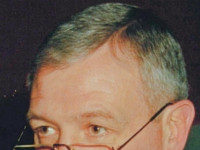Steve Vaughan was a geologist from New Brunswick who became one of the foremost mining lawyers in the world.
Courtesy of the Family
An elder statesman of Canada’s mining industry, William (Steve) Vaughan is credited for helping to elevate the stature of the country’s industry both at home and around the world as a leading legal adviser on natural resource law, project finance and mineral policy.
Called upon to advise not only Canadian junior mining companies and big corporations but also governments worldwide, Mr. Vaughan used his expertise to help strengthen mining and fiscal policies in the global minerals industry.
“He was like a legal legend in the mining law world,” said Pierre Gratton, president and chief executive of the Mining Association of Canada. “Everybody knew him.”
Having first trained as a geologist, Mr. Vaughan, who died on Sept. 12 in Singhampton, Ont., at the age of 82, never lost his love of the Earth’s rocks and what they contain. At a moment’s notice, he would leave his Toronto legal office and travel to a remote mine site. His desire to delve deeper into the exploration development side of the industry took him to 70 countries; on his travels he slept in a yurt in Mongolia, hiked through brush in northern Quebec and climbed a mountain on a donkey in Mexico to reach a gold mine project.
“I don’t think you can really be a successful mining lawyer unless you understand the science and the engineering that goes into finding and developing a mine,” Mr. Vaughan said in a 2017 video for the Canadian Mining Hall of Fame.
Drawing on his expertise, he negotiated with Pakistan’s government to help amend the country’s constitution to divide the ownership of mineral commodities between the country’s federal government and its provinces. More recently, he was retained by the U.S. government to help sort out complex mining issues in Afghanistan after the United States identified lucrative, untapped mineral deposits, including iron, copper, gold and industrial metals like lithium, in the war-torn country.
“He was always very positive and enthusiastic,” said Ed Thompson, a mine developer and founding member of the Canadian Mining Hall of Fame. “He never slowed down. He had great enthusiasm. He always had a lot of great projects ahead of him.”
Steve Vaughan in 2014 receiving an honorary doctor of laws degree from the University of New Brunswick.
Courtesy of the Family
Mr. Thompson remembers travelling together to see a copper showing in northern Quebec and being amused at Mr. Vaughan’s boyish reaction to seeing the metal; he was almost jumping up and down with excitement.
“He was a geologist and prospector at heart,” Mr. Thompson said.
Mr. Vaughan served on several governmental advisory committees to improve mining and investment policies in Canada and promote better practices in the industry. In the mid-1990s, he was involved in the Whitehorse Mining Initiative – a group including industry, government and Indigenous people – which led to policy reforms and a broader acceptance of mining’s economic role in Canada and around the world.
Following the Bre-X fiasco in 1997, Mr. Vaughan was vocal about the need to revamp the country’s reporting standards. He played a key role on the Mining Standards Task Force committee formed by the Toronto Stock Exchange and the Ontario Securities Commission to restore investor confidence. It called for stronger mining disclosure standards for mineral projects, later adopted as National Instrument 43-101.
“Canada has the best standards around the world that people follow,” said Michael Bourassa, a partner at Fasken law firm in Toronto. “Steve was at the forefront. He was a huge instigator,” in bringing about those new standards, he added.
He also worked diligently on developing e3 Plus, an information resource intended to help Canadian companies exploring for minerals improve their social, environmental and safety performance. In the late 1990s, he helped create the World Mines Ministries Forum, bringing mine ministers together in Toronto to develop mineral policies.
Born on Nov. 26, 1937, in Fredericton, Mr. Vaughan was the eldest of seven children. His parents, Bill and Verna Vaughan, struggled to get enough food on the table for their family. Mr. Vaughan’s father owned a local garage with his brother. At the age of 15, Mr. Vaughan got a job working underground at the Burnt Hill mine outside of the city. The work fascinated him.
He studied geology at the University of New Brunswick (UNB) and later got his master’s degree in geology from McGill University. Working at a mine in Manitoba, he soon found himself reconsidering his career choice. While climbing a ladder up the mine, a miner unknowingly put a hose down the opening. Suddenly, he was doused in water, which immediately froze on the ladder rungs making it almost impossible to continue climbing.
“When I got up I thought, there has to be a better way to be in the mining business,” he said.
He went back to UNB and got his law degree. In 1965, he moved, with his wife, Donna, to Toronto where he spent the majority of his career as a partner at Aird & Berlis LLP. He and Donna had three sons together before divorcing in 1979. Mr. Vaughan’s sons lived with him after the divorce, leaving him to juggle raising teenagers with running his busy legal practice. In 1987, he married Jayne Stanley.
Mr. Vaughan’s life was struck by tragedy in 1994 when his son Nelson was diagnosed with metastatic melanoma at the age of 30 and died a few months later.
“He couldn’t talk about it without tearing up,” his son Chris said.
Less than 10 years earlier, Mr. Vaughan’s brother Ken had died of melanoma. His brother Rod also had melanoma. Suspecting that his family carried a genetic predisposition for the cancer, he contacted researchers at the University of Toronto. Doctors subsequently discovered that the family carries a genetic mutation that increases their risk of melanoma. The important discovery led to other families getting tested for the gene that causes inherited melanoma. Mr. Vaughan himself underwent testing and was found to have the melanoma gene mutation; in his life he had several melanomas removed from his body.
Known for his boundless energy, Mr. Vaughan channelled some of it into the young lawyers he mentored. When he became head of the mining group at McMillan LLP in 2002, he implemented a secondment program for international mining lawyers. Lawyers from Chile, Argentina, Mongolia, China and other countries trained under him before returning home to practice.
In the rare moments when Mr. Vaughan slowed down, you might find him fly fishing on New Brunswick’s Miramichi River.
Courtesy of the Family
Admired for his keen sense of humour and storytelling, he was known to be tough but reasonable.
“A brilliant counsel with an outstanding knowledge of his trade, complemented by his Maritime charm. He was frank and fair. He could debate with the best,” said David Matheson, a former law partner and close friend.
In the rare moments when Mr. Vaughan slowed down, you might find him fly fishing on New Brunswick’s beautiful Miramichi River – often still with his cellphone glued to his ear.
In 2014, Mr. Vaughan received an honorary doctor of laws degree from UNB and in 2017 was inducted into the Mining Hall of Fame.
He never retired and continued to practice law when he moved to a home with a big garden in Singhampton, Ont. In the last months of his life, he battled cancer and died of a heart attack.
Mr. Vaughan leaves his wife, Jayne; sons Derek and Chris; stepson David Reed; 10 grandchildren and two sisters.
“It’s fun,” Mr. Vaughan said of his work, “fascinating fun, all day, every day.”
Credit: Source link




























